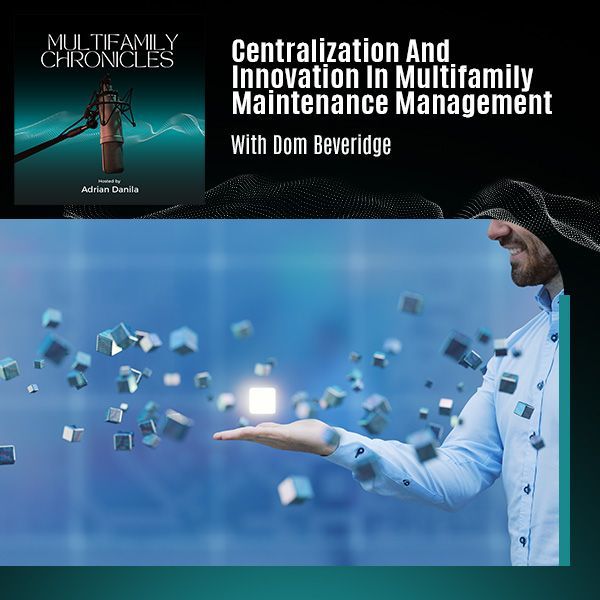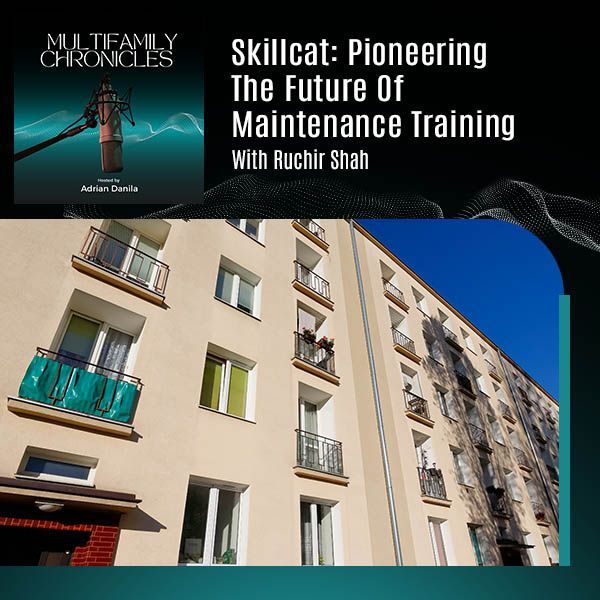Multifamily Secrets: How To Approach The Shortage Of Qualified Labor And Improve Property Performance With Peter Richter
In this episode, Peter Richter, Director of Investor Relations and Capital Markets at Interwest Capital Group, shares his journey of getting into the industry in that position. Peter also shares how their company has been managing their assets and approaching a shortage of qualified labor – one of the biggest challenges facing the industry. A shortage of talent reflects on property performance, making it harder to operate and making you possibly lose revenue from an investor’s standpoint. Peter also drops information bombs about what Interwest does and stands for, how to thrive in multifamily, and more! Tune in now and get ahead!
---
Watch the episode here
Listen to the podcast here
Multifamily Secrets: How To Approach The Shortage Of Qualified Labor And Improve Property Performance With Peter Richter
We have as a guest, Peter Richter. Peter is the Director of Investor Relations and Capital Markets with Interwest Capital Group. Welcome to the show, Peter.
Thanks for having me, Adrian. I've been tuning in to your program for a while. You got some great content on here.
Peter, why don't you introduce yourself to the audience, to begin with? Tell us a little bit about your background, professional and personal.
I grew up in Philadelphia and moved out to San Diego about ten years ago. I am the Director of Investor Relations and Capital Markets here at Interwest Capital based out of San Diego. I'll give you a little backstory on how I got into this role and this industry. I got my start on the management side of real estate.
I began my career with a small company, which primarily managed college student housing near San Diego State University. That's where I learned the basics, the ins and outs of boots-on-the-ground property management. It wasn't long. I worked there for a few years. The company had rapid growth. I moved over to the multifamily side and worked my way up fast in multifamily here in San Diego.

I started as a leasing agent and worked my way up to assistant manager, and then eventually managed my own assets. Eventually, I found myself working for UDR, which is one of the nation's largest residential REITs. I was managing their entire San Diego portfolio, which is all downtown mid-rises and high-rises. The UDR portfolio is where I got into the investment side of it.
With UDR, the portfolio is part of a joint venture with the large LifeCo. Part of my job included reporting to their asset management team at LifeCo and interfacing with their team. I found myself drawn to this aspect of the job, the reporting and telling the story of the asset, and converting it into a financial report. I found myself drawn to this.
Eventually, I took a job with a local real estate syndicator as their Director of Investor Relations and Asset Management. I stepped away from the onsite management. I had gone into the asset management side and investor relations. I found there that I had a love for crafting communications to investors, taking the financials and turning them into a story, and making it digestible to our investors and partners alike. Fast forward a few years, and I landed here at Interwest Capital, which is also based in San Diego. It's an amazing company. When I arrived here, I immediately felt like I had found my home. It has been great.
Tell us a little bit about your current role with your company. What do you do? What's your day-to-day? What are your responsibilities?
Interwest Capital is a real estate investment firm specializing in multifamily. We also have some hospitality assets throughout the country. Here at Interwest, I manage investor communications for the company. I also work on sourcing new equity on both the institutional side and with private investors. I’m reaching out and building our private investor base. Also, maintaining and establishing new relationships with institutional investors. Here at Interwest, we use both. We use a combination of institutional investors, some of the largest in the country or world, as well as individual investors to put together our equity stacks.
Would you like to share a few great things that are happening at Interwest?
We just closed on an amazing property, a 539-unit, Class A, multifamily, and mixed-use in San Antonio. It’s a uniquely designed property close to some of the region's largest employers. It's truly a beautiful asset. We're also working right now getting ready to finalize the financing and start a development here in San Diego in a cool little area called North Park.
We're building a 136-unit LEED-certified platinum mid-rise with some cutting-edge technology, solar panels, and a hydraulic lift system for the cars. You park and come down with your smart key. You hit the fob, and your car is brought on a conveyor belt directly to you. It's an innovative project and we're very excited about it. We acquired the land a little over a year ago, and have tremendous cost spaces on land. It's shaping up to present itself as a great success. It's looking great. That development is what I'm focusing on right now.
Your company is an investment group. You guys don't self-manage. You have a third party.
We use third-party management companies. This is the first time I've worked at a company that didn't have an in-house management team. It's been refreshing because we get to go into whatever market we want. We don't need to have an infrastructure in a particular market. You and I were talking about Atlanta. We love Atlanta. We don't have any employees in Atlanta. We don't have any infrastructure. What we would do is we would find the best management company in that area and the best in the market and have them manage the asset for us. We then get to rely on and utilize their data, experience, and resources in a particular area, which has helped out big time.
We're talking about operating third-party and multifamily operators. One of the biggest challenges that multifamily is facing currently is the shortage of qualified labor, personnel, and talent. Obviously, when you're short on talent, then this reflects on the property performance typically. It makes it harder to operate and you might be losing some revenue out there or making less profit. From an investor's standpoint, how do you approach this challenge? How do you work and help the operators that are managing your assets to overcome the issues of staff shortage?
We don't manage in-house. We do have an asset management team in-house, which is a talented group of individuals. Pretty much all of them have backgrounds in property management. They manage our property management teams as well. What we've seen is that specifically, the maintenance side of it has been disproportionately affected by the personnel shortages.
We have to be a lot more competitive with compensation. It slowed down some of our renovations. When you have turnover, you need to bring in a new maintenance manager to oversee those renovations and start back at the beginning. Sometimes it slowed down renovations. Ultimately, it extended the renovation timeline. It also eroded a little bit of operating margins because we have to get more competitive with compensation because of the shortage.
It made us hyper-focused on selecting the right people for the right job. That's evident in the maintenance side and our asset management team. Although we have third-party managers, when we're hiring for a position like a maintenance manager, which is a relatively important role, we interview them here too. We make sure that we believe that they're a good fit. They're not somebody who's going to leave in six months. They are happy with what they're being paid, and they're fulfilled with the challenges and opportunities within that job or role.
Getting competitive with compensation due to shortage had us hyper-focused on selecting the right people for the right job.
If I'm getting this right, your involvement in the current environment is a lot more hands-on than it used to be a few years ago. Am I correct in saying that?
One hundred percent, especially on the personnel side. Your original question was about how it impacts operations from an investor's point of view. When you're investing, you need to now look at the expense line item of compensation, and realize that historically, companies usually grow that about 2% to 3% annually. That has now stepped up from 3% to 5%. You need to keep in mind when you're underwriting a deal or a new investment that there's a good chance with the current personnel shortages that your compensation expense is going to grow a little bit faster than historically.
I would like to get your take on the compensation aspect of recruiting and getting talent. My background is mainly in maintenance. I came up from the maintenance side of the industry. The way I always looked at the situation, especially with maintenance that you mentioned, is what would it take for us operators or maintenance managers to say, "Can the investors look at increasing their pay as an investment in their business?"
Let's say that you will invest in a one-year period. You have a staff of three maintenance professionals on one of your properties. If we were to pay $30,000 more, like $10,000 per employee per year, and we get the right employees, those people could bring us returns that are probably 5 or 10 times more. That's a real situation. People don't know what they're doing. They'll save you a lot of money. Is that something that you would consider in the future or that you are currently considering?
Absolutely. In this market, you have to be willing to pay up for a higher skill set. For example, if you have a maintenance manager who also understands pool maintenance. You're willing to pay him an extra $8,000 a year than someone who has the same experience but doesn't understand how to maintain a pool. Pool maintenance can cost you $1,000 a month for a third party.
In the multifamily market, you have to be willing to pay up for a higher skillset.
If you can do that in-house, the higher-skilled employees can, and rightfully so command a higher wage. When you look at employee turnover, as a manager, I know you've been through it where you hire someone new and you got to start back from zero. They're not able to do stuff on their own for months until you train them.
There's a cost to that because now you're training them instead of doing something else. It becomes somewhat of an eye-opening realization for the industry as a whole that people need to be paid fairly. From an investor's point of view, it might be a little bit more difficult to make a deal work because you have higher costs, but it feels right.
It feels like people should be paid for their skillset and the value they're bringing in. We've seen it across the board where people have stepped up. We've seen maintenance teams, office teams, and leasing teams step up. They're willing to work harder and smarter and learn more. On-the-job training and education are huge components. You can even factor that into the compensation package.
If you can get HVAC certification or you tell an employee, "We're going to hire you and we're going to invest and get you certified for HVAC certification," now you're bringing value to them and they're bringing value to you simultaneously. It's been great in that sense. It feels good that people are being paid more and bringing more value to their roles.
That's truly amazing to hear from an investment angle because I always struggle with the fact that I wasn't sure what the investment side of business thinks. I occasionally spoke with individuals that were in your position or higher. I always wanted to get that angle from the investor's standpoint. I always have trouble accepting the fact that typically, there's not enough money out there to pay someone a higher rate, someone that's going to save you tens of thousands of dollars in short-term, mid-term, and long-term.
It's that saying, “We're going to be penny-wise and dollar foolish.” I'm very excited to see that there's a shift in the approach from an investor's standpoint. If you're driving that type of approach, management is going to fall on line. I don't think they're going to be unhappy to have more money available to hire the right people or the more qualified people. That's quite excellent. That gives us hope.
It starts from an investor's point of view. Prior to the acquisition, we're doing the underwriting and we're modeling out the performance of an asset. We are now including a higher compensation in our budget in what we're modeling out in the underwriting. If the deal doesn't work because we're paying somebody a little bit extra, then the deal doesn't work.

Here at Interwest, we're very discerning about the deals we pursue. If it doesn't work paying somebody a good salary and reinvesting in them through education and training, then the deal doesn't work for us. Like you said, penny-wise and dollar foolish, that's not something we would ever pursue. That's not the area where we want to cut back if that makes sense.
It makes a lot of sense. It's a healthy way to look at things because of what I've been seeing, especially with COVID, inflation, and everything. That's affecting the labor force and it's eating off their buying power. For the most part, it’s been disheartening. I have to be completely honest with you. There's no way we're going to be able to keep personnel that's not paid what they need to be paid.
When I say what they need to be paid, it's not just looking at what the property next door is paying. There's so much competition out there. You have to look at the economy in general and the entire market. Sometimes as property management industry, we're neck and neck with warehouse workers. If someone has a choice to pick between a warehouse job in a controlled environment, inside, and no on-call, or do the same thing and do maintenance, bring their own tools, be on-call, and be outside in the elements, the choice is pretty obvious.
In order for the industry to compete with that, you also have the gig economy where people made their own schedules and everything. There's so much out there. How are we going to compete? How are we going to get decent professionals to take care of the assets? This makes me very hopeful. Approaches like your company are having the right approach for the present and also building for the future.
I went over my background in onsite property management. I was in the trenches many times with the maintenance team working on those fire alarms that happen when you're onsite. A lot of the people here at Interwest have a background in property management onsite. That changed our perspective a little bit. We know when you have to turn a unit in three days and the stress that it can put on a maintenance team. It gives us an advantage in some ways.
I could see a bright future in this type of approach like your company. I'm excited to follow your group in the future because great things are going to come out of that approach. I believe so.
Thank you. We hope so.
Current interest rates evolve. It's not necessarily a good thing. It feels like every day they're going up. How are they affecting multifamily investing?
You're having a tremendous fact. There are a lot less transactions going on. If you speak to multifamily brokers, a lot of them have a lot of free time on their hands now. They're also getting very creative, so I have to take my hat off for them. As interest rates go up, it devalues real estate. Basically, it's created this cap rate expansion.

Historically, in some markets, we're looking at 3% or even sometimes below 3% cap rates. The idea was that you can borrow money close to 3% and grow rents. All of a sudden, you have a positive leverage scenario. You were able to go in with negative leverage and soon develop positive leverage as your yield was higher than the interest rate.
Now, with interest rates moving up, the cap rate has expanded. Going into negative leverage is a thing of the past from day one. Because of this, cap rates have expanded and that brings valuations down. Additionally, value-add has been a very popular asset class. You go in, you fix an apartment, renovate it, increase the rents, and either sell it or refi.
A lot of times firms have been using floating bridge debt to get those renovations done, and then they replace it with long-term loans. What happens is they got that floating bridge at 3% or 3.5%. As interest rates spike up, so does that interest rate. They're having trouble refi-ing it. It's creating some turmoil in the market right now. We're seeing valuations come down. Some people are in positions where they're scrambling, but it's just starting. It has had a tremendous effect.
With what you just explained about the interest rates, I'm assuming that has changed the investor preference too. Could you elaborate on that? How does that change the preference and investor behavior?
Those heavy value-add property investments that I was referring to have taken a backseat now to the core and core-plus assets as a defensive play. A lot of people are expecting or witnessing a recession of some type. We've got a lot of deliveries and new supplies in markets. The idea is that you want to have a quality asset. People are moving away from the heavy value-add properties and the older properties like the '70s and '80s vintage to '90s and 2000s, and a little bit less risk on the business plan instead of doing giant renovations.

We have a firm, Restore Decor, where we buy core-plus assets to light renovations or maybe a tech package, and bring it back up to the core. We’re able to present those apartments at a competitive rate. We're seeing a lot more defensive investing. When you sell it or let’s say you're selling in five years, you can still say the next person has a bit of a value-add opportunity on it. We're not taking that operational risk right now.
From an occupancy rent collections standpoint, what type of trends are you seeing in various markets that you're operating in?
We work in a pretty wide variety of markets from the East Coast to the West Coast. The degree of impact varies from market to market. Overall, there's been a general winding down of that momentum we felt over the last 12 to 18 months where vacancy was at all-time lows. Rent growth was double digits. We're seeing definitely that winding down as far as occupancy and rent.
The collection is interesting. Markets that struggled with collections during COVID that had real challenges are still having challenges. Vegas was a tough one. Whereas in other markets, collections weren't as much of an issue. Obviously, there is some volatility during the pandemic. People were waiting on rent relief or were temporarily out of work. That's gotten back to normalcy in those markets. It's market dependent.
We're anticipating a slight decrease in occupancy and a deceleration in rent growth in the coming quarters or maybe in the next twelve months. People either are now out of work or inflation is hitting their pocketbooks. Historically, this type of constrained economy has led to less household formation. Instead of moving out to your parent's house, maybe you stay longer. Instead of branching out from your roommate, maybe you keep a roommate. Instead of having two households, you've got one. We see household formation slowing over the next twelve months. Our hope is that would create a pent-up demand that in 24 to 36 months, it’s released and creates outsized growth again.
It's very interesting that you're mentioning this. I have a couple of investments myself. I'm seeing the tendency when my applicants are coming to apply for apartments. You could see that there are two families applying for one apartment. My apartments are three-bedroom apartments, so they could accommodate a larger number of people. Two families are not an issue. Beforehand, a family of two will rent an apartment for themselves, but with everything that's going on out there, people are getting more rent conscientious. They're trying to live within their means more. You'll save more, eventually.
This is getting a little bit granular and a little bit speculative, but three-bedroom apartments in markets like this often increase in demand. Instead of three individuals all having one-bedroom apartments, now they say, "Let's team up. Let's all move into a three-bedroom." That sector or those floor plans are going to do well. Whereas expensive studios and one-bedrooms specifically might be more impacted.
The next stop we want to discuss with you is ESG, as it relates to either the investment side or the multifamily operational side. I know that your company's big on this. Would you please take a little time to explain what ESG is? What's your company's approach in regard to ESG?
Relating back to compensation and how it's refreshing to see compensation moving to provide people with livable wages, ESG is another one of those subjects that we are very passionate about. It’s like, “It's about time.” ESG stands for the environmental impact, the social impact, and the corporate governance of a corporation or company.
Now, you're seeing more and more capital, specifically institutional capital, being directed by ESG. It's directing the flow of capital. Certain funds will only invest in ESG-compliant or ESG investments that have an ESG profile. On the operational side, it's challenging. The first is environmental. What is the environmental impact of the investment?
I spoke about the development we have going on right now with the platinum-certified solar panels. We have low-flow plumbing appliances. We’re trying to reduce the environmental impact at every stage. I didn't mention this. That property I mentioned is a Class A apartment. We've got a few Teslas that residents are going to be able to use. They don't have to have a car. They can use our electric vehicles on rideshare. It's pretty cool. That's the environmental side.
The social side is it's dynamic, but on the operational side, are you impacting your community in a good way? For example, in that development, we have an affordable housing component. We're offering a dedicated portion of the units to come to BMR or Below Market Rate for people who might not be able to afford those. San Diego has this housing crisis, so it's so expensive.
This provides housing to people who might otherwise not be able to afford it. We've got credit reporting that we're going to be doing there for people. We're rolling that out across our portfolio. We’re trying to create more economic inclusivity, especially in workforce housing, by allowing people to use their rent payments to build their credit. That's one example. It’s the social impact of the operations in the corporation as a whole. How diverse is your employment base? Do you have a diverse board of directors? Are you being socially conscious? We do volunteer events here at Interwest. It's changing the way people look at their social impact.
Governance is a little bit more straightforward. How ethical and transparent is the governance of the company? What is the decision-making process? By making that governance more transparent, it gives investors peace of mind knowing that you don't have one person at the top or one rogue person who can sidetrack a whole business operation. It's been great. ESG is something we're passionate about. We're still developing it here. I'm very involved in it. All my coworkers are very passionate about it. It's about time.

We're at a point where I'm going to ask some rapid-fire questions for you. Ready?
Let's go.
What are your favorite books, fiction, professional, or non-fiction?
I much prefer reading fiction. I like the classics. I like Ernest Hemingway quite a bit, For Whom the Bell Tolls. I recently read a book called Shantaram which suggests to anybody who wants a great adventure book about a guy in India's sub-world. It's an amazing book. Shantaram would probably be one of my favorite books. I just finished Atlas Shrugged by Ayn Rand. It’s a great book. On the professional side, probably the book that had the biggest impact on me is a book by Dale Carnegie called How to Win Friends and Influence People. It's a great book. Anyone who wants to interact better with other people should read it at some point.
Thank you for sharing with us. Next question. How did a failure or an apparent failure help you build future success?
It's a bit of happenstance. I was managing a high-rise in downtown San Diego, and I was approached by another company. They recruited me and gave me a job offer. It was more than I was making and a great opportunity. I accepted it. I put in my notice. Two days before I started, the owner of the company decided to hire a family friend and they rescinded my job offer.
I went back to my previous employer and said, "This is what happened." They said, "We already hired somebody for your old role." Overnight I was out of a job. It was devastating, but I worked hard and I focused on myself. Within a few weeks, I got in touch with UDR and they recruited me to take over a property here in San Diego. It was probably one of the best things that ever happened in my career. UDR was an amazing company. I was able to rapidly ascend the ranks there. I was pressed for a little bit. All of a sudden, I didn't have a job and it happened so quickly, but it all worked out.
I love stories like this because I always tell people that when a door closes, you don't know how many other doors will open for you. It's maybe a sign that you're not being sidetracked. You're just being redirected.
That adversity forces people to recalibrate and refocus on what's important to them and where they want to be going. That stuff stinks and it hurts. It can knock you down emotionally, but it's an opportunity. You got your back against the wall and not a whole lot to lose. Pick your track.
The stuff that stinks and hurts and can knock you down emotionally can really be an opportunity. Because now, you got your back against the wall, not a lot to lose. Pick your track.
How beautiful it is when you overcome, you look behind, and you say, "I did it myself." How much does that boost your confidence in yourself and make you proud of yourself?
It’s impossible to measure how much it improves your confidence. I remember the call. It was a long interview process with UDR. I was at the airport coming back from a wedding. I got a call from the recruiter saying, "We're going to be offering you a position." I had to put it on mute and I screamed at the airport. I thought I was going to get arrested or something. I was so happy. That was probably one of the best feelings in my professional career.
What advice would you have for someone or a young person ready to enter the real world, get a job, be out there, and make the best for themselves right out of school?
Let's assume they're 22 years old. In the first five years, you're going to be figuring stuff out but have fun. Go travel and put yourself in as many diverse situations as you can. That diversity of experiences will help you down the road. Work for a little bit, save up some money, and then take three months off and go backpacking. If you love skiing, go get a job at a ski resort and ski your brains out.
You'll be able to find work later on, trust me. If you're smart and you've got a college degree, you'll be able to find a good job and build something. You'll never be able to be a ski bum in Colorado again. I went backpacking through South America. On a shoestring budget with a couple of my friends for about eight months. It was the best experience of my life. I wouldn't trade that for anything.
I have that with me forever. I'm married now. I can't just take off for eight months. Once you start your career, get in early and leave late. Work as hard as you can and dedicate yourself to the company that you're working for or to your employer. Also, an advice I always give people is to find some allies within the company. Find a couple of people who have been there for a while and do whatever they want. Let them know that you've got their back. They will help advise you. It'll become somewhat of a mentor-mentee relationship. They'll help you guide through.
Once you start your career, work as hard as you can and dedicate yourself to the company that you're working for, to your employer.
I love this piece of advice. Do the jobs that other people don't want to do. Volunteer to do it. That's going to create a lot of leverage for you. In the last few years, what new belief, behavior, or habit has improved your life the most?
It’s probably getting up early and working out. I'm embarrassed to say that I took that hiatus from it. I used to be in good shape, and then I didn't workout for probably six years. A few years ago, I started getting up and just finding time to get some fitness in my life. By doing that, I feel sharper. I have more energy. I feel more motivated. I feel generally more positive about myself and confident. Fit in some kind of physical activity, whether it's a run or doing push-ups in your apartment. If you can go to a gym, workout. It's amazing what it does to your overall perspective, how you feel, and your mood.
I do a little bit of exercise myself. I get up at 4:00 to 4:30 in the morning. Before I even start my work day, I walk for 75 minutes and I've been doing this for a number of years now. It keeps me alive and keeps me together. It's that important to me. If I wouldn't do it, I'll die in a few years. I feel that way. It’s that extreme of a difference that makes for me.
It really does. Health-wise, your mood and emotions help control them. People are very busy. We're all very busy. Starting off, if you haven't been doing it for a while, dedicate 15 to 20 minutes, "I'm going to get a workout and I'm not going to give myself any excuses, if I have to get up 20 minutes early or go to sleep 20 minutes later or I'm getting it 20 minutes less of TV.” You start working your way up. They say that habit takes 28 or 21 days to form. At this point, I'm sure if you didn't do it, you'd feel almost lost in your day because it's become a habit where now it's not even a chore. You want to do it.
I actually feel guilty when I get to miss a day here and there. I'm occasionally missing, but not many days. When I do miss, I feel guilty that I haven’t done that. I should have made the time. I should have done it. That motivates me the next day to not miss it. I better not miss the next day. You're right. Habits are very powerful. Once you get to the point where you build them, it's on an automatic pilot. You don't even think twice. You just get up there, get dressed, and do it. It's so amazing how it changes your life.
There's a book called The Power of Habit that one of my bosses gave to me. I read it a while ago. It talks about those positive habits, but also how easy it is to develop negative habits. Whether that's coming home and immediately having a drink or needing a sandwich. Whatever it is. You get out of those negative habits and you break those away and try to instill some positive habits. Sky's the limit.
Between that, spending extra time, and investing in yourself. The sky is the limit. You're off to the races. When you feel that you're losing focus or you feel overwhelmed, what do you use to get back on track? How do you get back on track?
I don't fight it. I do a lot of writing in my job, whether it's investor correspondence or investment memos. If I feel I'm distracted, I'll get up, go for a quick walk, and then come back. If I try to fight it, then the work I produce is of lower quality. Maybe some people are able to block out an hour. I generally can't spend a full hour and a half doing one task. I need to get up, clear my head, switch to different tasks, and then circle back. Especially if the task requires creativity. If I'm working on a spreadsheet, I can keep going. When it requires some creativity and some complex thought, I get up, go for a walk, grab a cup of coffee, make a quick phone call, and then come back. I come back with a fresh set of eyes almost.

It’s very powerful, especially for creative minds. You can't just force creativity. It has its own mind and flow. Peter, it was great having you here. We're unfortunately approaching the end of our conversation due to time reasons. I like to give you the opportunity to say something that answers a question that I wish I would've asked, but I didn't. Just say something that matters to you or is important to you. Secondly, what are some ways for our audience to get in touch with you if they want to network or contact you?
My name is Peter Richter. I am the Director of Investor Relations and Capital Markets here at Interwest Capital. If you'd like to get in touch with me regarding future investment opportunities, we are open right now to accepting new investors. You can reach me at Peter@InterwestCapital.com or go on our website, there's a Contact Us form. Ultimately, we are at a very interesting time. I've only been in the industry for about ten years. I haven't been through a full downturn or volatility. We are excited about opportunities, yet we are being very defensive. For everybody out there, this is an exciting and interesting time. Keep your cards close and power through.
Peter, thank you so much for accepting my invitation for being a guest on our show. I had a great time chatting with you. I hope to do a follow-up episode sometime in the future because there's so much more. It's very fascinating. Your side of the business is not understood by many. Mainly, I'm coming from the operations side. I like to educate myself and I'm sure that many on the operations side do not understand the investment side, so I'm trying to bring this to the show. This was very educational for me and I'm sure for those that follow. I thank you again for coming. I appreciate you taking the time to share your experience and your knowledge with the audience.
Thank you for having me, Adrian. It's been a pleasure.
Everybody, I hope to see you back here. Have a great day.
Important Links
- Interwest Capital Group
- Restore Decor
- For Whom the Bell Tolls
- Shantaram
- Atlas Shrugged
- How to Win Friends and Influence People
- The Power of Habit
- Peter@InterwestCapital.com
- Contact Us - Interwest Capital





